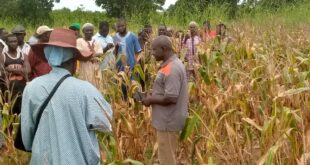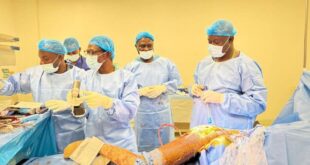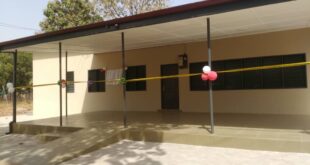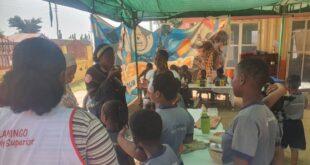
Salaa, Ghana – Arahamatu, an 11 year old pupil of the Salaa D/A Primary School at Salaa, a farming community in the Gushegu Municipality of the Northern Region, has lauded the efforts of World Vision International Ghana towards poverty eradication in her community.
According to her, but for the intervention of international nongovernmental organisation, the women and children of Salaa would have still been faced with the challenge of constantly trekking longer distances in search of potable water.
Arahamatu said this in an interview with Savannah News during a visit to Salaa and several other communities in the Gushegu Municipality and Karaga District where World Vision International Ghana is implementing several models of economic and livelihood empowerment under its Household Food Security and Resilience project.
The international organization through their sponsors is supporting over 2,000 registered children in each of the two Area Programmes within the two Districts (Gushegu/Karaga) who are at different levels of the academic ladder.

Arahamatu is one of many children in the Gushegu and Karaga areas who are being sponsored by philanthropists through World Vision. Recently, her sponsor sent money to the organization to address any pressing need in Salaa where she lives with her parents and attend school.
According to Felix Apeti, World Vision International Ghana Programmes Manager in charge of the Gushegu Cluster, in a discussion with the chief and people of Salaa, it emerged that their most pressing need was potable water.
“Salaa has been struggling with water for a while now…fortunately in 2016 we drilled a well (borehole) which was about 2.5 –3 kilometres away from the community. So even though they had access to water, children were still struggling at dawn and after school to go in search for water because of the distances involved and this affected their enrolment, retention and even time to play in school. That also had a resultant effect on economic activities that were within the Salaa community”, he pointed out.
He continued: “…..we assessed the existing borehole we built and the yield was good, so we channeled the resource into mechanizing it. Of course the sponsorship package (community gift) was not enough but the office (World Vision) seeing the need also contributed equally to a total of Gh₵60,000.00 to get water readily available for the Salaa community”.

With regards to the impact of the availability and easy access to potable water now, Mr. Apeti said there is increased enrolment and retention in the community school and children can now also have time to play and learn.
He said members of one of World Vision’s Savings for Transformation (S4T) group in Salaa called “Kpangmang-noo-kumiya Bangbihiri niima”, have also seen an improvement in their shea butter processing business.
On her part, Arahamatu, said the improved water situation has lessened their plight in the constant search for potable water far away from their homes. “Now that we have water close to us, we can fetch for our parents to prepare food for us to eat and also bath”, she stressed.
There are many international organisations operating in the Northern Region than any part of Ghana, but few of them are actually making real impact through their poverty eradication interventions.
From the implementation of health related interventions to conflict management, water, sanitation, education and agriculture among others, thousands of lives have been transformed over the years by the hundreds of foreign and local charity organisations in the region.

Undoubtedly, World Vision International Ghana is one of the real life transformers in the Northern Region and for that matter Northern Ghana in the last two decades. In its mission to address child poverty, food and nutrition security, water and sanitation issues, lack of access to financial services and vulnerability to climate change and disaster risk, World Vision has left many footprints across the length and breadth of Northern Ghana.
The organization has many success stories to tell including that of Arahamatu’s community where hundreds of men and women have been lifted out of endemic poverty through the S4T which is a model under World Vision’s Household Food Security and Resilience project.
S4T is a savings and loans scheme that enables women and men including the youth to come together as a group and save money for future investments and other immediate plans they may have.
The scheme also enables participating members of various distinct groups to save money they make from their own investments as a form of social security to fall on in the event of any emergency.
By Savannahnewsonline.com/Philip Liebs
 Savannah News Online Reporting Only What Matters Most
Savannah News Online Reporting Only What Matters Most



